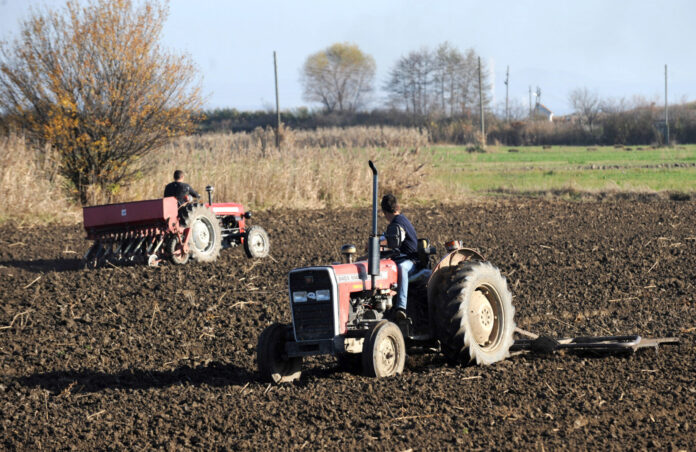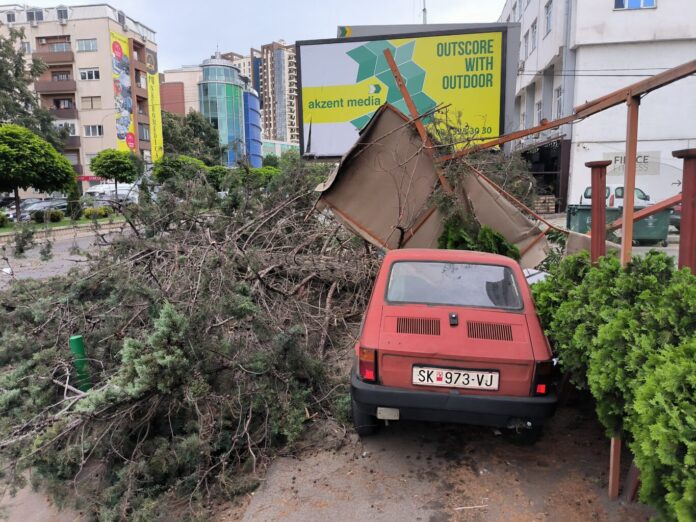Necessary agriculture on the eve of the new cold wave

Rain is welcome for soil moisture, only low temperatures not to « eat » our fruits
After a long time, this spring proved to be really humid for Macedonia and the region, and although the rain is necessary, especially in terms of food production, heavy rains can do great damage.
New cooling and new rainfall have already been announced, both in the rain and snow in the higher places, which will certainly bring lower temperatures. These changes can do great damage to agriculture, a sector that is particularly important for food production. As the synoptics say, strong north winds will blow this weekend, temperatures will drop significantly and snowfall is expected in some of the lower places. On Monday, there will be light snow, and morning temperatures in many places will be negative. Then comes a period of stable and colder weather with morning temperatures that will be around zero everywhere.
Experts warn of the danger of frostbite fruit because of the new cold wave
Oscillations of temperatures and frosts in spring days can do great damage to agriculture, and as Agro -Meteo suggests, a Spread of the Hydrometeorological Service, precipitation is welcome to provide water in the soil, but warn of the danger of frostbite.
Last week we had a changing cloudy weather with occasional rain. The maximum daily amount of rain, 41mm, was registered in Gevgelija on March 30. In the last six days of the month at several locations in the country we had a cyclonic breakthrough with continuous effective and short -term heavy rains accompanied by isolated city and thunderstorms.
– The intensity of precipitation is of great importance for agricultural plant production. The rain can be low intensity (heavy rain) or with high intensity (heavy rain). Intense heavy rains can be harmful due to reinforcement of erosive processes on inclined terrain, and can cause flooding and damage to crops. Heavy rainfall can lead to creation of torrential watercourses and possible outflows and floods on certain agricultural areas. In intense heavy rains, the soil cannot absorb the whole amount of water, so, for example, when heavy rain falls by half an hour the soil absorbs 35 percent, and in the tiny rain for six hours the soil absorbs about 93 percent.
Let there be rain, but let it be less intensity and balanced
Smaller rains with lower intensity are the highest benefit for plant agricultural production. After such rains the soil remains in favorable condition for sowing, crops are developed more intensively, explains Vesna Markovska, adviser to agro -meteorology.
Markovska indicates that, however, these rains that have fallen are of great importance to all crops and will contribute to increased soil moisture, which is needed for the spring preparation of soil for planting certain crops.
– For the stern cereals in our country, it is essential in the period from early March to early June. Wheat consumes the largest amounts of water in the phases of spinning, slicing, milk maturity. The spoiling phase takes place in the spring. At the beginning of this stage the reproductive organs are formed, which will depend on the fruiting, so at this stage the plant must have sufficient amounts of water and nutrients. That is why this rain will have a positive impact on autumn wheat – Markovska emphasizes.
She adds that fruit crops have a variety of water requirements due to the deep root, so they relatively easily submit drought, but optimum humidity is needed at the beginning of vegetation for normal blooming and fruit formation.
– The need for water in young plantations is of great importance for rapidly rising and forming good fitness. In the shortage of water during the rise of fruits, they remain small, and they can decrease them. Therefore these rainfalls have a positive impact. Also, due to higher relative humidity in the plant zone, more favorable conditions for the occurrence of plant diseases and pests can be created, so the crop examination and control is needed – explains the representative of the Metrology Department of the Hydrometeorological Service.
Synopotists predict a significant temperature drop, which is expected at the beginning of the week
Rainfalls are also announced these days, local instability with heavy rain, thunderstorms and high winds, even a cold air mass from the north with snow on the mountains is expected. Synopotists announce that temperatures will drop significantly.
– This significant drop in temperature, which is expected at the beginning of the week, can again endanger crops, especially fruit trees, with the possibility of frost, as well as causing damage, mostly in those already blossomed. We recommend that agricultural producers take appropriate measures to protect their crops against freezing, to clear the drainage channels for easier surface waters and protection, to take preventive measures to strengthen the greenhouses and other structures, to protect plants, especially fruit species, from the appearance and development of diseases.
According to synopticists, the minimum temperature will range from – 6 to 8 degrees Celsius, while the maximum temperature will range from 3 to 19 degrees Celsius. ER





:format(webp)/s3/static.nrc.nl/wp-content/uploads/2025/06/05163439/data133217982-f902a2.jpg)
